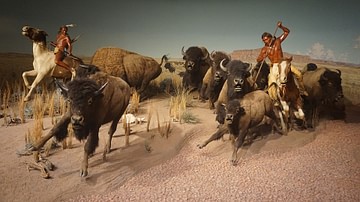Search
Search Results

Video
Washita Battle Facts: Custer's Controversial Victory
The Battle of Washita remains one of the most debated events in U.S. history. Custer's attack on a Cheyenne village led to the death of peace chief Black Kettle and many others. Some call it a necessary military action, while others view...

Video
Captain Kidd: The Hanged Pirate (Pirate History Explained)
Music used: Music by Brandon Fletcher https://www.youtube.com/watch?v=aeWUjzIIJqY https://www.amazon.com/gp/product/B01329YTKW https://dbfiechter.bandcamp.com/album/ahoy-mateys https://itunes.apple.com/us/album/ahoy-mateys!/id1024793076...

Video
Toyotomi Hideyoshi: The Ambitious Warlord (Japanese History Explained)
Toyotomi Hideyoshi would step out from his master Oda Nobunaga's shadow and would go onto not only unify Japan as his master intended, but also to expand into Korea and China. A peasant in the beginning, Hideyoshi would rise up the ranks...

Article
Medieval Knights: 12 of the Best
The knights of medieval Europe were meant to be the finest fighting men of their age, even more important, they were expected to be pure in thought and deed, as exemplified in the chivalrous code which they (usually) followed. Here are the...

Article
How the World Was Made: A Cherokee Creation Story
How the World Was Made is a creation story of the Cherokee nation, which, like many such tales of the Native peoples of North America, begins with a world covered by water from which dry land is formed and natural order created by beings...

Article
Cats in the Middle Ages
Cats in the Middle Ages were generally disapproved of, regarded as, at best, useful pests and, at worst, agents of Satan, owing to the medieval Church and its association of the cat with evil. Prior to the widespread acceptance of Christianity...

Article
Ancient Persian Gods, Heroes, and Creatures - The Complete List
The term 'mythology' comes from the Greek mythos (story-of-the-people) and logos (word or speech), meaning the spoken story of a people. Every civilization of the ancient world developed a belief system, which is characterized as 'mythology'...

Article
Vikings TV Series - Historical Accuracy
Vikings (2013-present) is a historical fiction TV series created and written by English screenwriter Michael Hirst for the History Channel. Filmed in Ireland, the show draws on Scandinavian and European history and lore as it follows the...

Article
Buffalo and the Plains Indians
The buffalo were essential to the Plains Indians, and other Native American nations, as they were not only a vital food source but were regarded as a sacred gift the Creator had provided especially for the people. Buffalo (bison) supplied...

Article
Cheyenne Creation Story
The Cheyenne Creation Story is the account of the beginning of the world, the seasons, and the first people in the time before time when all was water, and nothing existed but the Creator and aquatic birds. There are many versions of the...